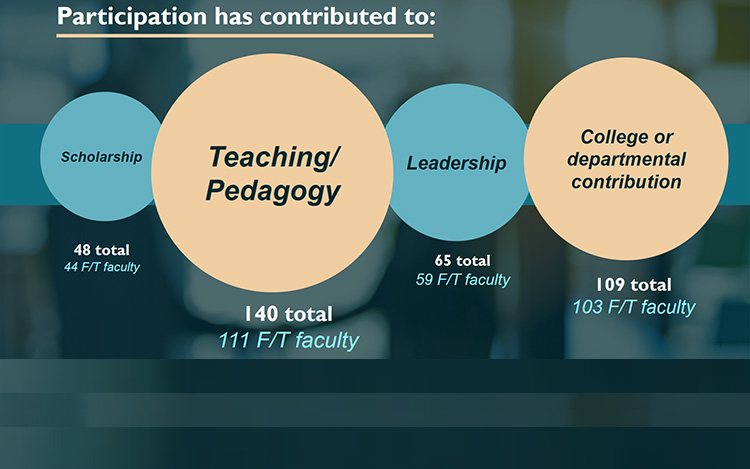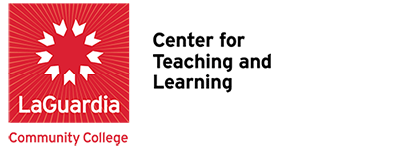 In Fall 2019, the CTL implemented an online survey and needs assessment to learn how LaGuardia faculty have experienced various institutional supports designed to encourage their growth as teachers, scholars, and College leaders. I presented the results of the faculty needs assessment at the Fall Instructional Staff meeting, where I shared a brief overview of President Arcario’s vision almost 20 years ago for the CTL to provide a space that supports faculty in their primary responsibility to teaching LaGuardia’s diverse community of learners. Since 2000, the CTL has helped establish and scale a broad range of pedagogical innovations through faculty and CTL staff collaborations that engage faculty in communities of practice centered on student success in and out of the classroom.
In Fall 2019, the CTL implemented an online survey and needs assessment to learn how LaGuardia faculty have experienced various institutional supports designed to encourage their growth as teachers, scholars, and College leaders. I presented the results of the faculty needs assessment at the Fall Instructional Staff meeting, where I shared a brief overview of President Arcario’s vision almost 20 years ago for the CTL to provide a space that supports faculty in their primary responsibility to teaching LaGuardia’s diverse community of learners. Since 2000, the CTL has helped establish and scale a broad range of pedagogical innovations through faculty and CTL staff collaborations that engage faculty in communities of practice centered on student success in and out of the classroom.
More than 200 faculty viewed the survey, and 191 completed it, including 147 full-time faculty (roughly 40% of our full-time faculty). I highlight a few findings here, but please follow this link to see the full slide presentation:
- An important finding from an administrative perspective was learning that 90% who responded said they had implemented a learning activity or applied learning from their CTL experience. We see this as the broad purpose of the CTL’s work to support faculty with strengthening and deepening their practice as educators.
- Presented with a range of activities offered through the CTL, more than 100 faculty indicated they had participated in curriculum or assignment design, New Faculty Colloquium, or ePortfolio activities. Half (95) had participated in CTL activities focused on developing students’ academic skills, such as writing.
- Several themes emerged from 160 responses to an open-ended question about faculty’s motivation or primary reason for participating in CTL, including:
- 25% said CTL seminars were mandatory for promotion and professional development;
- 20% wanted to focus on pedagogy, and
- 15% indicated their primary motivation was voluntary interest in promotion and/or professional growth.
- More than 70% indicated their participation in CTL activities contributed to their teaching and pedagogy, while the CTL’s contribution to their scholarship, leadership, and college/departmental contributions ranged from 25% to 57%.
Faculty who indicated they’ve led a CTL seminar answered a separate question about the impact of that experience using a 5-point scale. More than 80% said three of the categories had a significant or noticeable impact on their experiences including enhancing their relationships with colleagues, broadening their collaboration, and advancing their knowledge of the college.
- Asked to rank the importance of six factors that might have contributed to their participation in a CTL seminar, “Impact on your own Teaching & Learning” and “Building Community across Disciplines” had the highest weighted averages; the difference in weighted averages among the remaining factors was negligible.
We also asked for faculty members’ suggestions, with 99 responses yielding 114 suggestions. Most suggestions were around specific pedagogies (e.g., student agency in learning, co-curricular and experiential learning), diverse PD formats (such as online and short-term programs), and community-building programs and activities (such as supporting collaboration, more inclusion and diversity, and faculty mentorship).
About half of the 120 respondents who said they had not led a seminar indicated they’d like to. This correlated with responses to an open-ended question about interest in interacting with the CTL: 32 of those 101 responses mentioned a desire to lead or design a seminar, with 1/3 coming from those identified as full professors. We saw some differences based on faculty rank (for those who indicated it). Across the board, four themes emerged: “Finding time to participate,” “Interest in leading a CTL seminar,” the “Relationship of participation to promotion & tenure,” and the “Value of building College-wide community.”
So, what’s next? Going forward, the CTL will solicit input from and foster greater collaboration with faculty. Depending on resources, we hope to bring more diversity to the activities & programs we offer, and will communicate better about new approaches CTL participants are learning and trying in their classrooms. We’re also looking for ways to engage more senior faculty and our dedicated adjuncts. Specifically, we are working to implement the following actions this year:
- bring back the seminar proposal process we piloted for 2017-18;
- establish a more transparent & equitable selection process and guidelines for seminar leaders; and
- connect with faculty governance as we shape CTL offerings.
Thanks to Kyoung Kang in the CTL for guiding the analysis and presentation of the report, and Priscilla Stadler, who was also instrumental in supporting the analysis.


